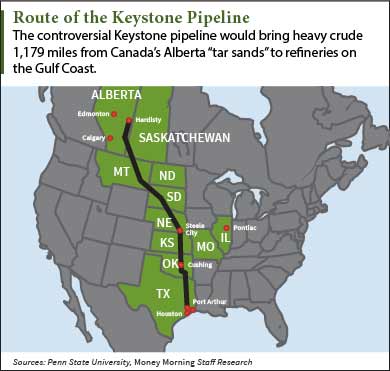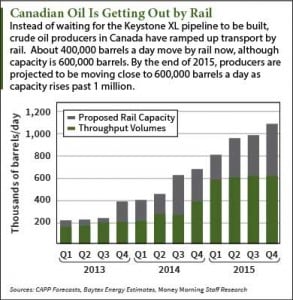President Barack Obama has promised a Keystone pipeline veto. Soon he'll get his chance to do it.

Today (Thursday) the Senate voted 62-35 to complete work on the Keystone pipeline bill. That sets up a final vote that should result in the bill landing on President Obama's desk. A Keystone pipeline bill passed in the House on Jan. 9.
The Keystone XL pipeline would bring heavy crude 1,179 miles from Canada's Alberta "tar sands" to refineries on the Gulf Coast. Many companies would benefit from the Keystone project, as we noted in November.
But other companies are rooting for a Keystone pipeline veto from President Obama. A veto would delay Keystone indefinitely, forcing Canadian oil producers to use alternatives.
Since winning the Senate in the November elections, it was clear the Republicans could get a Keystone bill through Congress. Whether the GOP can muster the 67 votes needed to override a Keystone pipeline veto, though, is a different story.
President Obama could change his mind and offer to trade approval of the Keystone XL pipeline for some climate change concessions. But a Keystone pipeline veto seems where we're headed.
A veto wouldn't kill the Keystone pipeline. But further delays would make it less likely to be built.
The approval process has already dragged on for six years. In November the company behind the Keystone XL pipeline, TransCanada Corp. (NYSE: TRP), said the cost of the project had swelled from the original estimate of $5.4 billion to $8 billion.
And the added delay would give companies that offer alternatives to Keystone - other pipelines, railroads, and tanker barges - a major boost.
Such companies already are transporting Canadian tar sands oil that would have run through a completed Keystone pipeline.
"That oil is already moving to market and it's found alternative ways to get there," TransCanada CEO Russ Girling said on FOX Business Jan. 19. "We can get it onto a pipe, get it to the coast, put it onto a barge and get it to the Gulf Coast that way. Either rail or barge doesn't require a presidential permit."
The oil has continued to move despite the big drop in oil prices, which Girling believes will rebound eventually.
A Keystone pipeline veto will give these companies a lot more business...
Stocks Hoping for a Keystone Pipeline Veto
Companies that stand to benefit from a Keystone pipeline veto by President Obama fall into three categories: alternative pipelines, railroads, and oil shipping by tanker and barge.
We've found the best stocks in each industry. Take a look:
Alternative Pipelines
TransCanada's own "Energy East" pipeline proposal would carry Canadian tar sands oil 2,900 miles to St. John's in New Brunswick. But Energy East still requires Canadian government approval and faces stiff resistance from environmental groups. However, TransCanada thinks it will have Energy East up and running by 2018. So TransCanada is a hedge play; it could win whether Keystone is built or not.
But the best bet in this category is Enbridge Inc. (NYSE: ENB). Enbridge got approval for its 728-mile Northern Gateway pipeline last year. While it still faces some legal challenges, plans call for it to be built in 2016. This project will carry Alberta crude west to a deep-water port in British Columbia. There the oil would be loaded onto tankers for seaborne transport. While some U.S. West Coast refineries could get this oil, the plan is to sell most of it to Pacific Rim customers who have been willing to pay more.
And just this month Enbridge completed two U.S. pipeline projects that offer an immediate alternative to Keystone. Flanagan South, which runs from Illinois to Cushing, Okla., links to existing pipelines that run into Canada. The crude is carried to the Gulf Coast via the Seaway pipeline. Enbridge also just finished expanding the capacity of that pipeline. The two projects will bring 200,000 additional barrels a day of Canadian oil to Gulf Coast refineries. That's less than a quarter of Keystone's expected capacity of 830,000 barrels a day, but Flanagan South/Seaway is operating now.
Enbridge stock was trading today at $48.63. It has a one-year target of $65.
Railroads
 As the approval process for the Keystone pipeline has dragged on, oil companies have relied mostly on railroads to move Canadian crude to the United States. Right now, about 400,000 barrels of Canadian crude a day move by rail. And the longer Keystone is delayed, the higher that number will rise.
As the approval process for the Keystone pipeline has dragged on, oil companies have relied mostly on railroads to move Canadian crude to the United States. Right now, about 400,000 barrels of Canadian crude a day move by rail. And the longer Keystone is delayed, the higher that number will rise.
Several railroads have gotten a boost from transporting Canadian tar sands oil. That includes companies such as Canadian Pacific Railway Ltd. (NYSE: CP), Union Pacific Corp. (NYSE: UNP), and Norfolk Southern Corp. (NYSE: NSC).
The top play here is Canadian National Railway (NYSE: CNI). CNI has one key advantage over the others. It's the only railroad with a direct line to the heart of the Athabasca Oil Sands. Back in 2007 CNI bought the track from Athabasca Northern Railway for $25 million, and promptly invested $135 million in upgrades.
Even if Keystone does get built, CNI's direct line will continue to carry crude as production increases. This year the railroad plans to double the amount of oil it shipped in 2013 from 73,000 carloads to 150,000. To do that CNI has invested in 40,000 new rail cars.
CNI stock was trading today at $67.18. It has a one-year price target of $83.90.
Shipping by Barge and Tanker
The same crude oil often moves by more than one mode of transportation. Rail and pipelines often end at ports, where the oil is loaded onto tankers and barges. Here we're not talking about the giant supertankers the take oil across the oceans, but smaller vessels that hug the coastlines and use America's vast internal system of rivers.
The biggest tank barge operator in the United States is Kirby Corp. (NYSE: KEX). While slower than rail transport, moving oil by barge can be up to a third cheaper. The volume of crude from both Canada and the U.S. moving on Kirby's tank barges has soared over the past five years. With oil prices low, producers have to take a hard look at Kirby's tank barges.
KEX stock has gotten badly beaten up over the past six months on an earnings miss in October as well as the plunge in oil prices. But at $72.77, KEX is now relatively cheap.
A more intriguing play is a company that doesn't transport oil at all, but builds the things that do. Trinity Industries Inc. (NYSE: TRN) makes both rail cars that transport oil and the tank barges that Kirby uses. Demand for both figures to stay strong for the next couple of years. In fact, what would seem to be bad news could end up being great news for Trinity. In response to recent oil train accidents, President Obama has proposed several design changes to make the tank cars safer. The new rules would require between 50,000 and 80,000 tank cars to be replaced. Orders have dropped recently in response to falling oil prices, but Trinity's backlog should hold the company over through 2015.
Trinity stock has taken a 40% hit from the drop in oil prices, making it a bargain now. It has a price-earnings ratio of just 6.71, about half of its industry average. TRN stock was trading today at $26.88. It has a one-year price target of $44.20.
Keystone a Foolish Fight: The Keystone pipeline has become a top issue in Washington, but it certainly doesn't deserve to be. In fact, this long-running war of words illustrates just how broken Washington really is. Both sides have exaggerated their case to win political points. It's amazing they can keep a straight face when they're saying such outlandish things...
Follow me on Twitter @DavidGZeiler.
Related Articles:
About the Author
David Zeiler, Associate Editor for Money Morning at Money Map Press, has been a journalist for more than 35 years, including 18 spent at The Baltimore Sun. He has worked as a writer, editor, and page designer at different times in his career. He's interviewed a number of well-known personalities - ranging from punk rock icon Joey Ramone to Apple Inc. co-founder Steve Wozniak.
Over the course of his journalistic career, Dave has covered many diverse subjects. Since arriving at Money Morning in 2011, he has focused primarily on technology. He's an expert on both Apple and cryptocurrencies. He started writing about Apple for The Sun in the mid-1990s, and had an Apple blog on The Sun's web site from 2007-2009. Dave's been writing about Bitcoin since 2011 - long before most people had even heard of it. He even mined it for a short time.
Dave has a BA in English and Mass Communications from Loyola University Maryland.



